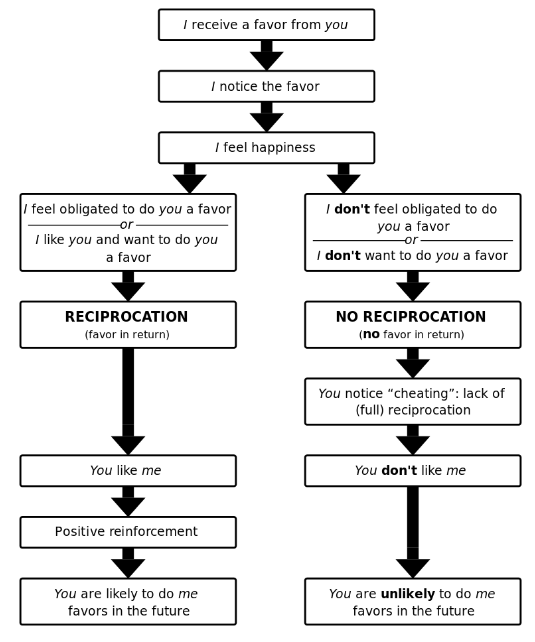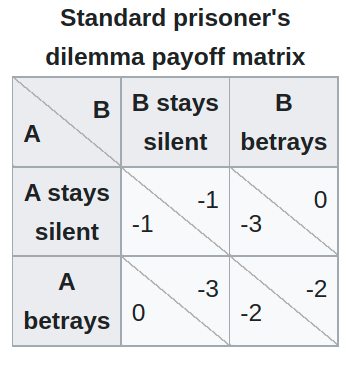How to build trust
It all boils down to a simple question:
“When do you cooperate and when do you (cheat) defect on a cooperative relationship?”
I, like most people, have trust issues. And lets face it, people are full of shit and you need a framework/mental-model to not make a fool of yourself.
TLDR - Use a forgiving tit-for-tat strategy, aka reciprocal altruism
Reciprocal Altruism
We’ve always been told that its survival of the fittest. You have to be selfish, look out for yourself, be competitive and outrun the other person in order to survive. What if I told you that Darwin was wrong and there are numerous examples in nature where an organism temporarily reduces its fitness (makes a sacrifice) for the benefit of another organism.
Reciprocal altruism is the act of showing kindness/favour to the other individual with an expectation that they’ll do the same from their end. You can see this behaviour in cleaning symbiosis in fishes and herbivores, vampire bats regurgitating blood so that there sibling bats do not starve, vervet monkeys activating alarm cells to protect their clan( despite the fact it puts them in danger), sterile worker bees dedicate their whole life to serve the queen bee and never get to reproduce.
This flowchart from wikipedia explains it well.

Its not always survival of the fittest, but survival of the kindest. So, be kind.
Priosoner’s Dilemma
In 1980, Robert Axelrod conducted a tournament where he invited people to come up with their own strategies for a Prisoner’s Dilemma game and made these players compete against each other in a round-robin fashion.
You can try playing this on an online simulator or use a standard PD payoff matrix like the one below. In every round, you have an option to either cooperate or defect and based on your opponent’s choice, both are awarded points. End goal is to maximize your payoff to win the game. What strategy would you use?

Not surprisingly, the most optimal strategy that came out of this was tit-for-tat. You start by cooperating and keep doing that until the opponent defects. Later in the game, if the opponent starts cooperating again, you switch back to cooperating. Try it!
Why did it work?
- Its nice: You start with playing fare(be nice/cooperate)
- Retaliatory: If the other person cheats, you cheat against them
- Forgiving: If they cooperate, you cooperate with them the next time
- Transparent: Its clear cut in its play, not some probabalistic thing.
One may argue, what if the other player betrays you. Aren’t you at a loss?
You may lose a few battles, but you’ll always win the war.
Remember, reciprocal altruism?
What about second chances?
Hol’ up! What if person B did not actually cheat, but due to some random reason, you received the wrong signal. Now A thinks B has cheated and he goes on to cheat in the next round. B thinks A has cheated, so he starts cheating in the next round. And the cycle goes on and on. Sounds familiar?
People are complicated and there’s always room for “mis-communiation”, “unreasonable expectations”, “He said, she said”, “mixed signals”, “mis-information”. Real life tit-for-tat strategy ends up in a series of stupid fights until the relationship no longer exists ( you stop playing the game).
Well to avoid this, you need to acquire a forigiving tit-for-tat strategy where you cooperate for one more round, to avoid the possibility of a wrong signal. You need to believe in second chances and give the other person the benefit of the doubt.
And if all of this is too boring, just listen to this J. Cole. song -
J.Cole - No Role Modelz (Lyrics)
Peace ✌🏻
Interesting stuff
- Pavlov Strategy: You exploit the other person by repeating any action that gives you a good enough reward
- The Game of Trust
- Behavioural Evolution
- Reciprocal Altruism ( Wikipedia )
- Reciprocal Altruism ( Paper )